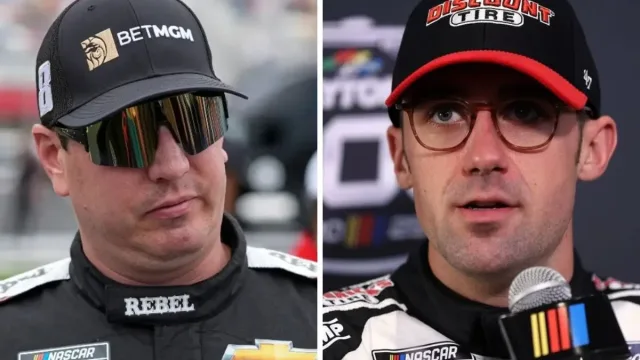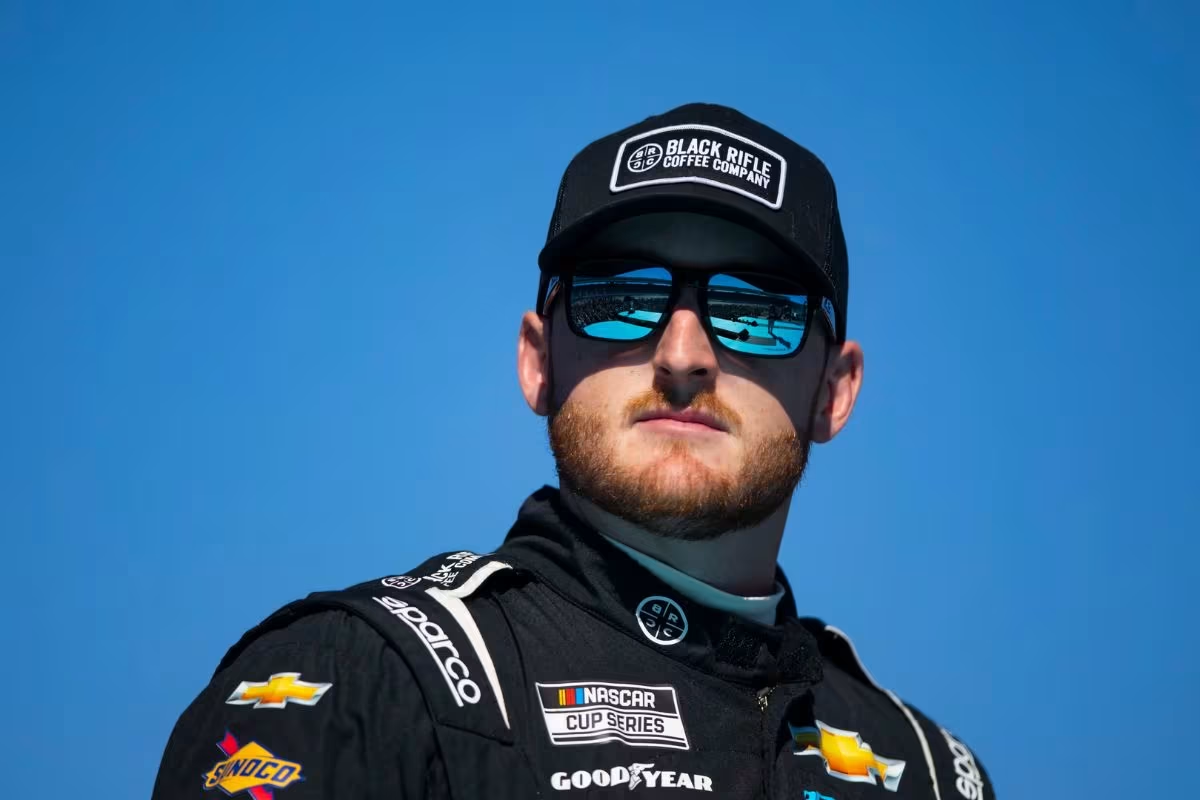Kyle Busch slams NASCAR favoritism after Austin Cindric avoided suspension for a retaliatory move against Ty Dillon. NASCAR’s decision sparked backlash, with Busch demanding consistency in penalties. Comparing past suspensions, he questions why Cindric only received a fine and points deduction. Denny Hamlin joins the debate, raising concerns about fairness. Meanwhile, NASCAR defends its ruling, citing track conditions. As tensions rise, drivers remain divided on what truly defines fair punishment. Is favoritism shaping NASCAR’s rulebook?
Key Highlights
- Kyle Busch criticizes NASCAR for inconsistent penalties regarding Austin Cindric’s actions.
- Busch accuses NASCAR of favoritism, implying some drivers are treated preferentially.
- Austin Cindric avoided suspension despite retaliating against Ty Dillon with a right-hook.
- Busch advocates for uniform one-race suspensions for intentional infractions.
- Disparities in penalties are seen as undermining NASCAR’s regulatory integrity.
Bubba Wallace’s Suspension and Austin Cindric’s Incident
In the world of NASCAR, fairness and consistency in penalties have come under examination, particularly when comparing the cases of Bubba Wallace and Austin Cindric.
Wallace’s remorse after intentionally right-rearing Kyle Larson at the 2022 Las Vegas race resulted in a straightforward one-race suspension. This decision by NASCAR was clear and decisive.
Meanwhile, Austin Cindric’s actions at the Circuit of The Americas, where he retaliated against Ty Dillon by right-hooking him, causing considerable consequences, did not result in a suspension. Instead, Cindric faced a 50-point deduction and a $50,000 fine, a decision that has sparked debate among the NASCAR community.
The disparity in these outcomes has prompted criticism from veterans like Kyle Busch and Denny Hamlin, who argue that the penalties lack consistency.
The contrasting handling of these incidents raises questions about the equity of NASCAR’s disciplinary measures, challenging the sport’s commitment to fairness.
Kyle Busch’s Past Suspension and His Take on Austin Cindric’s Punishment
Despite the passage of time since his own suspension, Kyle Busch remains vocal about the inconsistencies in NASCAR’s disciplinary actions, drawing parallels with Austin Cindric‘s recent case.
Reflecting on his 2011 Texas Truck Series incident where he was sidelined after a retaliatory crash, Busch highlights the significance of uniform penalties. Busch had issued a public apology, recognizing the gravity of missing a race, which serves as a deterrent for future infractions.
“I want to sincerely apologize for my actions.” – Kyle Busch
Observing Cindric’s situation, Busch questions NASCAR’s decision not to suspend him for a similar act of retaliation. He argues that a consistent application of rules is essential, stating, “Intent is intent. Put it in the rulebook.”
“I don’t wanna be in that business if I was NASCAR. Calling Balls and strikes is not who I wanna be if I am a NASCAR official. Intent is intent. Put it in the rulebook. A right hook will result in a one-race suspension. Period.” – Kyle Busch
Busch asserts that penalties should reflect the severity of the action, advocating for a one-race suspension as a standard consequence for intentional misconduct. The inconsistency in sanctions, he contends, undermines the integrity of the sport’s regulatory framework.
And add Denny Hamlin to this list. He said he didn't research the Cindric move to see intent but if it's a flagrant foul, it's a flagrant foul. https://t.co/TdYIUIP1RY pic.twitter.com/5r0TKXEum2
— Bob Pockrass (@bobpockrass) March 8, 2025
Kyle Busch’s Accusation of Favoritism
Kyle Busch levels a sharp accusation of favoritism within NASCAR, pointing to the disparities in how penalties are handed out. He highlights the inconsistency by referencing his own experiences with suspensions, contrasting them with the perceived leniency shown towards Austin Cindric.
Busch implies that certain last names might influence the severity of penalties, suggesting that NASCAR’s disciplinary actions are not evenly applied. His comments are emphasized by skepticism about the influence of the Cindric surname, despite Tim Cindric’s detachment from NASCAR operations.
“I did it once and maybe twice. Got off with the first time but definitely not the second time. Sat out the whole weekend to more races the second time. So that’s not his first offense… I don’t know if it’s a second offense. Like I said, some guys get off based on who I think their last name is.” – Kyle Busch
Further complicating matters, Busch’s statements gain further intrigue due to his association with Ty Dillon, whose brother is Busch’s teammate. This connection amplifies the drama surrounding the incident.
Denny Hamlin also echoes Busch’s sentiment, advocating for uniformity in rule enforcement. He stresses that intent should be the primary consideration, not the result, asserting that fairness must transcend personal affiliations within the sport.
“You judge intent. I don’t think the result should matter… The intent should matter… Anytime you have a new rule. There is going to be cause and effects to it. Sometimes it’s gonna seem worse than it should be and sometimes it’ll seem like not enough. That’s where you gotta draw a line and say that it doesn’t matter what the result is… A foul is a foul. A flagrant one is a flagrant one.” – denny hamlin
Ty Dillon’s Reaction and NASCAR’s Justification
How does one measure the adequacy of a penalty in the high-stakes world of NASCAR?
Ty Dillon, a seasoned competitor, expected NASCAR to impose a stricter penalty on Austin Cindric for his recent on-track actions. Dillon expressed disappointment, stating that a one-race suspension would have set a stronger precedent.
Despite acknowledging the imposed penalty of 50 points and a $50,000 fine, Dillon remains skeptical about its deterrent effect. His warning to Cindric emphasizes a lingering frustration and a demand for personal accountability.
“I was expecting a one-race suspicion. I’m glad they did something, though. I think 50 points and $50,000 is probably enough to make him think about doing something like that again. You hope it’s enough, but I think a one-race suspension is what most of us expected.”
“To me, they [NASCAR] did a good enough job of making something out of it. But just got to make sure that he knows specifically that he can’t do that again, especially to me.” – Ty Dillon
Meanwhile, NASCAR defended its decision through Mike Forde, emphasizing the unique circumstances of a road course with inherently lower speeds.
“In this case, we did feel that it was significantly different than the previous two. And the reasons are it is at a road course with lower speeds to begin with, and the results didn’t even draw a caution flag.” – Mike Forde
This reasoning, according to Forde, justified the perceived leniency, as the incident did not escalate to a caution flag. NASCAR’s stance highlights a nuanced approach, balancing the severity of actions with contextual safety aspects.
Differing Opinions from Other Drivers
The conversation surrounding NASCAR’s penalty decision is far from one-sided, as other drivers in the field voice their strong opinions.
Chase Briscoe stands firm in his belief that the intent behind the action, not the track or speed, should dictate the penalty. He argues that a right-rear hook, regardless of its context, consistently results in crashes and should be reprimanded uniformly.
“It doesn’t really matter if it’s at Talladega or Martinsville, whatever, the consequence is still the same. The guy who gets right-rear hooked is going to the back, is probably going to crash his car to a certain degree. I definitely think that it doesn’t matter what speed you’re going or how much the car gets torn up. It’s still the intent of doing it.” – Chase Briscoe
Conversely, Erik Jones aligns with NASCAR’s viewpoint, suggesting that context matters, and what might be acceptable at a particular track, like Watkins Glen, would not be tolerated elsewhere. Jones believes NASCAR’s stance was justified at COTA, equating it to short-track spins.
“If we go to Vegas next week and someone does it, it’s not OK. I think it’s pretty well established where it’s going to be an issue and what’s going to be an issue. I think what NASCAR was saying at COTA, and I agree with them, it was no different than spinning a guy out on a short track.” – Erik Jones
News in Brief: Kyle Busch Slams NASCAR Favoritism
Kyle Busch’s criticism of NASCAR’s handling of Austin Cindric’s incident highlights ongoing concerns about fairness and consistency in the sport. While NASCAR justified their decision, many, including Ty Dillon, question if favoritism influenced the lack of suspension.
This controversy emphasizes the tension between drivers and officials, with varied opinions on what constitutes appropriate punishment. As NASCAR navigates these challenges, the call for transparent and equitable enforcement of rules remains a critical issue within the racing community.
ALSO READ: Kyle Busch Suffers Another Public Embarrassment as Samantha’s Prank Steals the Show



